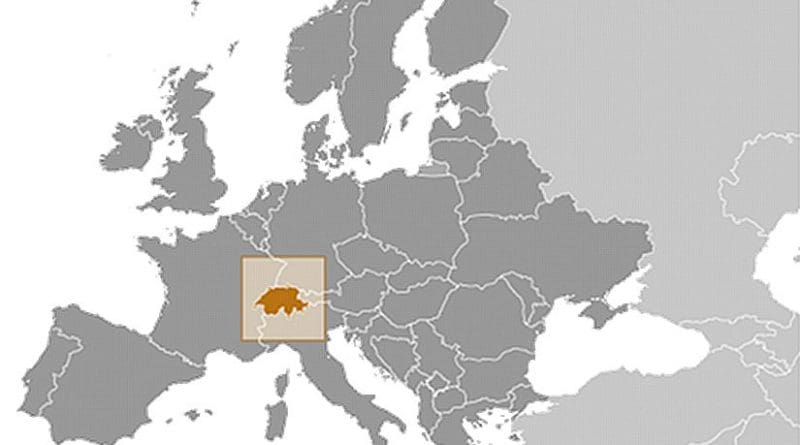Swiss Banks Believed To House Greek Taxes
By SwissInfo
By Etienne Strebel
Greek Prime Minister George Papandreou believes many of the billions that have been withheld from the Greek taxman are lying in Switzerland.
This, however, is largely the fault of Athens, according to Swiss-Greek economist Spyridon Arvanitis.
Ultimately, the only people who know how much untaxed Greek money is in Switzerland are the banks.
“I’ve heard every amount possible – even up to the sum of the Greek debt,” Arvanitis, from the Swiss Economic Institute (KOF) at the Federal Institute of Technology Zurich (ETHZ), told swissinfo.ch.
“There are rich Greeks, but talk of €200 million (SFr230 billion) is getting carried away.”
At any rate, Greek Finance Minister Evangelos Venizelos has told his Swiss counterpart Eveline Widmer-Schlumpf that Greece now wants to act and agree a withholding tax with Switzerland, similar to the one currently being negotiated with Germany and Britain.
Arvanitis believes an exchange of information wouldn’t cause problems for Switzerland “as long as it’s not a fishing expedition but a concrete list of ten, 15 names of people suspected of keeping untaxed money here”.
Fishing involves investigators trawling through masses of data in the hope of netting someone who might be committing a crime.
He says Switzerland shouldn’t offer any more than it has already done to other European countries.
“That would be enough to establish a bit of order. Concrete cases of tax fraud or evasion could also be submitted. And in cases where a firm suspicion exists, it’s already possible to make a request for legal assistance,” he said.
Good sign
Arvanitis said he wasn’t surprised by Papandreou’s comments in the Financial Times Deutschland on Wednesday that 14,000 people in Greece together owed the state around €36 billion in taxes.
“That’s always been known in the EU. It’s also been known that nothing’s been done about it. Nevertheless I see Papandreou’s comments as a good sign for Greece – if the prime minister addresses this problem in an interview, in front of the world, obviously he can’t now turn away from it.”
He added that owing to the meshing of politics and the economy it was understandable why until now there hadn’t been any talk of the large tax evaders.
“But the €36 billion has been known about for at least 18 months and as yet no one’s tried to round it up,” he said.
“Without political protection and corruption it wouldn’t be possible for individuals to owe millions in taxes. The €36 billion is owed on income that has been declared. And the real figure is thought to be 25 per cent more. One can only speculate on what else has been hidden away.”
Little confidence
Papandreou also told the Financial Times Deutschland he had little confidence in the Greek government’s ability to collect taxes.
“We have the impression that the administrative apparatus hasn’t shown itself to be very effective [at collecting taxes],” he was quoted as saying.
“Greece doesn’t have an administrative apparatus like in a Nordic country, which is well organised and to which instructions are simply issued and then reliably implemented.”
Arvanitis said people he knew in Greece believed even a state of emergency was necessary. One must patronise the tax departments a bit, he said.
“That is obviously not ideal from a constitutional point of view, but every constitution allows for emergency laws in emergency situations. And if a country is basically on the verge of bankruptcy, that’s an emergency situation.”
He is not thrilled by Papandreou’s view that collecting taxes would probably be outsourced to private companies.
“If you’ve got problems with corruption, without further ado select 20, 30, 40 good judges – those exist in Greece too – who can work on the tax cases from morning to night and reach a final decision, without recourse possibilities lasting for years. And the next day the bailiff demands the money from the tax evader. Done.”
This, he said, would send a good signal to the financial markets, European governments and the Greek people.
“Against all logic”
In order to fill the empty Greek coffers, the government also wants to raise VAT. Arvanitis isn’t convinced.
“Slapping on another two per cent would be fatal for the economy. And it’s not even guaranteed that you’d be able to collect the money because the attitude towards paying taxes there is poor,” he said.
Bans are also no solution, in his opinion. “You can’t suddenly limit capital transactions. That goes against all logic, including what else is going on in the European Union,” he said.
“Besides, in the 1970s and 1980s Greece had in part rigorous capital controls and the money still leaked out.”
(Adapted from German by Thomas Stephens)

